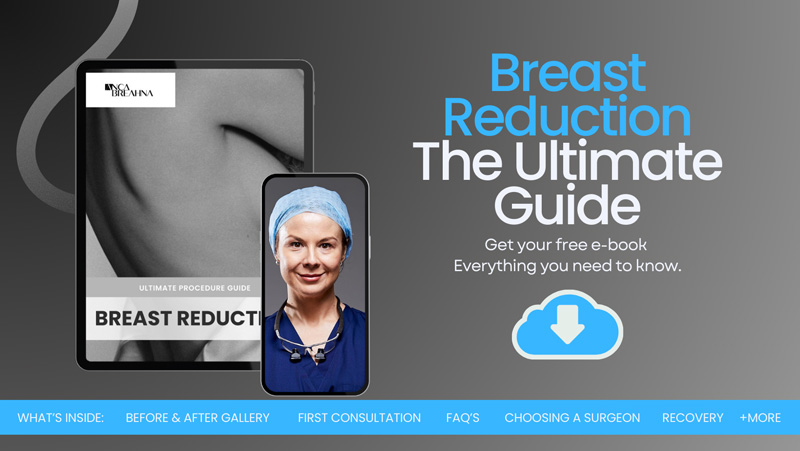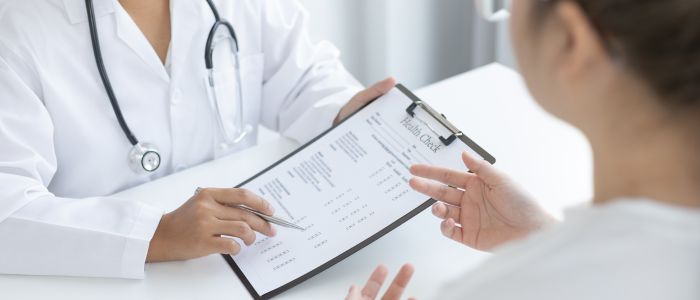
- What You Should Do after Getting Breast Reduction Surgery
- Take our Plastic Surgery Quiz to find out if you'd be a good candidate for cosmetic surgery.
- 1. Understanding the Post-Surgery Phase
- 2. Adhering to Medication Regimes
- Download Miss Anca Breahna Breast Reduction Guide
- 3. Wound Care and Hygiene
- 4. Wearing the Right Supportive Garments
- 5. Getting Adequate Rest and Sleep
- 6. Managing Your Activity Levels
- 7. Pay Attention to Your Diet
- 8. Attending All Follow-Up Appointments
- 9. Taking Care of Your Mental Health
- Breast Reduction Before and After Photos
- FAQs about Breast Reduction Surgery
- What is breast reduction surgery and why do people undergo it?
- Who is a good candidate for breast reduction surgery?
- What are the potential risks or complications associated with breast reduction surgery?
- How long does the recovery process take after breast reduction surgery?
- Further Reading about Breast Surgery with Consultant Plastic Surgeon Anca Breahna
- Medical References for Breast Reduction Surgery
What You Should Do after Getting Breast Reduction Surgery
Breast reduction surgery is a medical procedure that has proven life-changing for many women. It’s a viable solution for those battling the physical and psychological discomforts of having overly large breasts—issues like chronic back pain, skin irritation, and self-consciousness. However, as with any surgical procedure, what happens after the operation plays a pivotal role in determining the success of the surgery. The post-operative phase is just as crucial as the procedure itself. Following all post-operative instructions to the letter ensures a speedy, hassle-free recovery.
Among the experts in this field, Consultant Plastic Surgeon Anca Breahna, a renowned plastic surgeon from Chester, has established a solid reputation for performing successful breast reduction surgeries. An advocate of comprehensive patient care, Anca Breahna emphasises the importance of post-operative care as a key component of successful surgical outcomes. With impressive credentials and a wealth of experience, she expertly guides her patients through the recovery process, ensuring they understand each step, from wound care to emotional coping mechanisms.
Take our Plastic Surgery Quiz to find out if you’d be a good candidate for cosmetic surgery.
1. Understanding the Post-Surgery Phase
Breast reduction surgery, like any surgical procedure, demands some recovery time. Your body has just undergone a significant change, and it will need time and care to heal properly. The immediate period following your operation can be a whirl of emotions, from relief and excitement to discomfort and exhaustion.
The first few days after the surgery, you may feel sore and fatigued. You’ll notice swelling, bruising, and possibly changes in sensation around the nipple and breast skin. These symptoms are all part of the body’s natural healing process and shouldn’t cause alarm. However, if you notice severe, unrelenting pain, extreme swelling, or other worrying symptoms, do not hesitate to reach out to your plastic surgeon immediately.
You might also find that you’re more tired than usual, which is completely normal. Your body uses a lot of energy to heal, which can leave you feeling drained. Therefore, it’s important to listen to your body’s signals and rest when you need to.
Remember, the way people recover from surgeries can vary greatly. Some may bounce back more quickly, while others may need a little more time. There’s no ‘right’ speed for recovery—it’s essential to respect your body’s pace.
In this post-operative period, it’s also important to keep your emotions in check. It’s perfectly normal to feel a range of emotions, from relief and excitement about your new shape, to anxiety or temporary bouts of sadness. This is a significant change for your body and mind. Don’t hesitate to reach out to a mental health professional if you need to talk about your feelings.
It’s also important to keep in mind that the swelling and bruising that occur immediately after surgery won’t be your final results. As the swelling reduces and the incisions heal, your new breast shape will gradually reveal itself. Don’t be quick to judge the outcome immediately post-surgery. This phase is all about recovery and healing—both physically and emotionally.
2. Adhering to Medication Regimes
Post-operative care isn’t just about physical care; it’s also about diligently following the medication regime prescribed by your plastic surgeon. Pain relief is often a primary concern for most women after surgery. Your plastic surgeon will provide a prescription for pain medication to help manage this. It’s crucial to take this as directed—not more, not less—to effectively control pain without falling into potential overuse.
In addition to pain relief, you may also be prescribed antibiotics to prevent infection. Infections can severely delay your healing process and can, in extreme cases, lead to serious complications. Therefore, it’s essential to take your entire course of antibiotics exactly as instructed, even if you’re feeling better.
Furthermore, your plastic surgeon may recommend over-the-counter supplements like Vitamin C, Bromelain, or Arnica Montana to aid in your recovery. These supplements can potentially reduce bruising and swelling and speed up healing. However, always consult your plastic surgeon before starting any new supplement regimen.
In some cases, patients might feel they don’t need to continue with their medications because they’re feeling better. But it’s essential to remember that feeling better doesn’t always mean you’ve completely healed. Halting your medication prematurely can lead to unnecessary discomfort or complications.
Download Miss Anca Breahna Breast Reduction Guide

3. Wound Care and Hygiene
One of the most critical parts of the post-operative recovery process is wound care and hygiene. Proper care of your incisions can drastically reduce the risk of infection and improve the appearance of your scars over time.
Initially, your incisions will be covered with surgical dressings, which help protect the wounds, absorb any fluid, and keep the area clean. Your plastic surgeon will give you detailed instructions on how and when to change these dressings. Some patients may also have small drainage tubes in place to prevent fluid build-up. These are usually removed within a few days post-surgery.
Keeping the surgical area clean is absolutely vital. Depending on Your plastic surgeon’s recommendations, you may be advised to gently wash the area with mild soap and water, being careful not to rub or scrub the incision lines. Always pat the area dry – don’t rub.
While cleaning, it’s important to inspect the wound area. If you notice any signs of infection—such as increased redness, pus, or worsening pain—contact your plastic surgeon’s team immediately. A low-grade fever is another sign of potential infection. It’s essential not to ignore these signs, as prompt treatment can prevent more serious complications.
To promote optimal healing, avoid activities that could strain your incisions, including lifting heavy objects or intensive exercise. Such actions can lead to wound dehiscence (separation of the wound edges) and delay your recovery.
4. Wearing the Right Supportive Garments
The importance of wearing the right post-surgery garments cannot be overstressed. After a breast reduction surgery, your breasts will need ample support to help with healing, reduce swelling, and maintain their new shape.
Your plastic surgeon will likely provide you with a surgical bra to wear immediately after your operation. This bra is specially designed to offer firm support and comfort while allowing room for any dressings or drains. They are usually wire-free, made of soft breathable material, and have front fastenings for easy wear and removal.
It’s crucial to wear your surgical bra as directed by your plastic surgeon, even while sleeping. This might be round-the-clock for the first few weeks following surgery. It not only offers support but also helps control swelling and bruising, promoting a smoother recovery process.
After a few weeks, depending on your healing progress, your plastic surgeon might give you the go-ahead to switch to a regular, but still supportive, wire-free bra. At this point, underwired bras are still a no-go, as they can irritate your incisions and affect your healing.
In addition to the right bra, loose, comfortable clothing is also recommended. Tops that open in the front will be easier to put on and take off, reducing the strain on your healing incisions.
5. Getting Adequate Rest and Sleep
Sleep is a fundamental part of the recovery process. When you sleep, your body gets a chance to devote more resources to healing. Therefore, ensuring that you get plenty of rest and a good night’s sleep post-surgery is vitally important.
In the first few days following your breast reduction surgery, you might find yourself needing more sleep than usual. This is your body’s way of telling you it’s working hard to heal. Don’t fight this urge—listen to your body and sleep when you feel tired.
Positioning during sleep is another crucial aspect to consider. You’ll be advised to sleep on your back, preferably propped up with pillows. This position reduces swelling and helps prevent unnecessary pressure on your breasts, which could cause pain or disrupt the healing process. Sleeping on your stomach or side can put strain on your incisions and should be avoided until your plastic surgeon gives you the all-clear.
You might find this sleeping position uncomfortable, particularly if you’re used to sleeping on your stomach or side. It could be helpful to arrange pillows on either side of you to prevent turning in your sleep.
It’s also worth noting that some medications can cause sleep disturbances, such as insomnia or excessive sleepiness. If you’re having trouble sleeping, it’s important to discuss this with your plastic surgeon’s team—don’t simply reach for over-the-counter sleep aids.
6. Managing Your Activity Levels
While rest and sleep are crucial for recovery, that doesn’t mean you should be entirely bedridden. Light activity, such as short, gentle walks, can help boost your circulation, reduce the risk of blood clots, and even help you feel better overall.
Keep in mind that moderation is key. While it’s beneficial to move around, you must avoid strenuous activities or heavy lifting for at least six weeks, or until your plastic surgeon gives you the green light. High-intensity activities can cause complications such as bleeding, swelling, or wound separation.
Your activity level should be gradually increased, and it’s vital to listen to your body throughout. If an activity causes pain or discomfort, it’s a sign that you should take a step back.
You may be eager to return to your workout routine, but patience is critical. When your plastic surgeon does clear you for exercise, start slow. Begin with low-impact exercises and gradually increase the intensity as your comfort and stamina improve.
7. Pay Attention to Your Diet
After a major surgical procedure such as breast reduction, eating a balanced, nutritious diet is more important than ever. The foods you consume can significantly impact your body’s ability to heal, the speed of your recovery, and how well you can fight off infection. To learn more, read our article on What to Eat After Plastic Surgery for the Best Recovery.
Protein, often hailed as the building block of the body, plays a vital role in repairing and building new tissue. Include lean proteins like chicken, fish, eggs, or plant-based proteins like beans and lentils in your diet.
Vitamins and minerals, particularly Vitamin A, Vitamin C, and Zinc, are essential for wound healing and boosting immunity. Fresh fruits, vegetables, nuts, and seeds are excellent sources of these nutrients.
Hydration is also critical. Water helps transport nutrients in the body, aids digestion, and helps control body temperature. Make sure to drink enough fluids throughout the day.
While it’s tempting to treat yourself to sugary comfort food during recovery, it’s best to limit processed foods and refined sugars. These foods can lead to inflammation and slow down the healing process.
It’s also important to note that some medications may affect your appetite or digestion. If you’re struggling with nausea, lack of appetite, or other digestive issues, speak to your plastic surgeon. They may be able to adjust your medication or recommend ways to manage these side effects.
8. Attending All Follow-Up Appointments
Follow-up appointments play a crucial role in your recovery journey. These appointments allow your plastic surgeon to monitor your healing process, manage any potential complications, and guide you on the next steps of recovery. Skipping these appointments can risk complications going unnoticed, which could potentially impact your overall results.
Your first follow-up appointment usually occurs within a week after your surgery. During this appointment, your plastic surgeon will check your incisions, possibly remove drains if they were used, and assess your general recovery. This is also an opportunity for you to ask any questions or express any concerns you might have.
Further follow-up appointments will be scheduled over the weeks and months following your surgery. The frequency of these appointments will gradually decrease as you progress in your recovery. However, it’s important to remember that everyone’s healing process is different, so the number of follow-ups can vary from patient to patient.
During these appointments, your plastic surgeon may also provide guidance on scar management, return to normal activities, and the timeline for your final results.
9. Taking Care of Your Mental Health
Breast reduction surgery can be a quite an experience, bringing relief and newfound confidence. However, it’s not uncommon to experience a range of emotions, including anxiety, sadness, or frustration during the recovery phase. Your body has gone through a significant change, and it’s natural for your mind to need time to adjust as well.
Remember to be patient with yourself during this time. It’s okay to feel emotional or even have second thoughts about your decision. It’s a process, and it’s perfectly normal to have ups and downs.
Staying connected with supportive friends, family, or support groups can help manage these feelings. They can provide a listening ear, reassurance, or even practical help, like running errands or helping around the house.
It can also be beneficial to keep your mind occupied with light activities, like reading, listening to music, or watching movies. If feelings of anxiety or depression persist, it’s important to seek professional help. Mental health professionals can provide valuable strategies to navigate these emotions effectively.
Breast Reduction Before and After Photos
FAQs about Breast Reduction Surgery
What is breast reduction surgery and why do people undergo it?
- Breast reduction surgery is a surgical procedure that reduces the size of overly large breasts. People may choose to undergo this surgery for various reasons, including chronic back, neck, and shoulder pain, skin irritation under the breasts, difficulty performing physical activities, poor self-image related to large breasts, or difficulty fitting into clothing and bras.
Who is a good candidate for breast reduction surgery?
- Ideal candidates for breast reduction surgery are individuals who are physically healthy, have realistic expectations about the outcomes of the surgery, are non-smokers, and are bothered by feeling that their breasts are too large. The surgery is not recommended for those planning to breastfeed in the future as the procedure may affect the ability to do so.
What are the potential risks or complications associated with breast reduction surgery?
- Like all surgical procedures, breast reduction surgery comes with potential risks and complications. These may include reactions to anaesthesia, infection, bleeding, poor wound healing, changes in breast or nipple sensation, dissatisfaction with cosmetic results, loss of ability to breastfeed, and the need for revision surgery. It is important to discuss these risks with your plastic surgeon before making a decision.
How long does the recovery process take after breast reduction surgery?
- Recovery time can vary depending on the individual and the extent of the surgery. Generally, patients may return to work or school within 1-2 weeks post-surgery, and can resume most normal activities, including some forms of exercise, after about 4-6 weeks. The surgical scars will gradually fade over time, but it may take as long as a year or more for the final results of the breast reduction to settle.
Further Reading about Breast Surgery with Consultant Plastic Surgeon Anca Breahna
- Read more about Breast Uplift – Mastopexy
- Read Anca’s Blog How to Reduce Scars after Breast Reduction Surgery
- Read Anca’s Blog Plastic Surgery Procedures to Get Bigger Breasts
- Read Anca’s Blog What Is Normal during Breast Reduction Recovery
Medical References for Breast Reduction Surgery
- Breast Reduction Surgery Guide | ABCS
- Breast Reduction – Cleveland Clinic
- Breast Reduction Surgery | Johns Hopkins Medicine
- Breast Reduction | American Society of Plastic Surgeons
- Breast Reduction surgery – Mayo Clinic






 Ms Anca Breahna, PhD, MSc, FEBOPRAS, FRCS (Plast) is a highly regarded Consultant Plastic Surgeon specialising in the field of Aesthetic and Reconstructive Plastic Surgery. Anca performs a range of
Ms Anca Breahna, PhD, MSc, FEBOPRAS, FRCS (Plast) is a highly regarded Consultant Plastic Surgeon specialising in the field of Aesthetic and Reconstructive Plastic Surgery. Anca performs a range of 